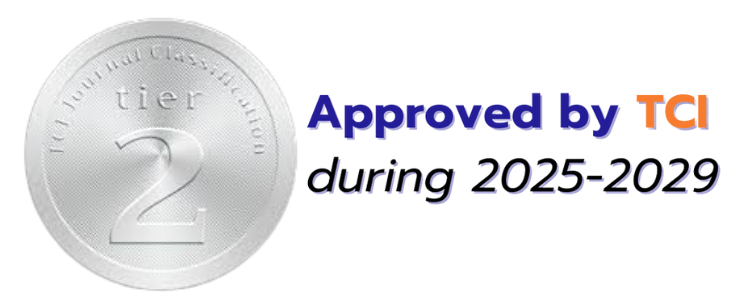The Development of Learning Management Competencies of Students Teacher by Design-Based Learning Management
Keywords:
Design-Based Learning, Learning Management Competency, Students TeacherAbstract
This research has the following objectives: 1) to compare knowledge about learning management before and after learning with the learning management process using design-based learning, 2) to study the learning management competency of teacher students after the learning management process using design-based learning, and 3) to study student satisfaction with learning management using design-based learning. The research sample was used by students teacher of the Faculty of Education and Development Sciences. In the Bachelor of Education program, Years 1-3, there are learning management subjects. A total of 41 people applied to participate in the project of volunteering students to manage learning in network schools, which was obtained from a random volunteer sampling. The tools were used in the research consisted of 1) a learning management plan according to the learning management process using design-based learning, 2) a test to measure knowledge about learning management, 3) an assessment of learning management competency, and 4) a questionnaire on student satisfaction with learning management using design-based learning. Statistics are used to analyze mean, standard deviation and t-test. The research results showed that 1) knowledge about learning management with the learning management process using design-based learning after learning (= 22.71, S.D.= 3.54) higher than before learning (= 16.05, S.D. = 4.69) was significantly at the level of. 05, 2) learning management competency of students teacher after the design-based learning management process (= 3.18, S.D. = 0.89), and 3) students' satisfaction with learning management using design-based learning was at the highest level. (= 4.68, S.D. = 0.47
Downloads
References
Arrausi, J. J. (2020). Understanding Design-based Learning (DBL) for teaching Z-Gen learners as Design Education in the 21st Century. Teachingdesigners.org. https://www.teachingdesigners. org/design-education-in-the-21st-century/
Azizan, S. A. & Shamsi, N. A. (2022). Design-Based Learning as a Pedagogical Approach in an Online Learning Environment for Science Undergraduate Students. Frontiers in Education, 7, 1-7. https://doi.org/10.3389/feduc.2022.860097/
Chalargse, N. (2015). The Teacher's Role and Instruction in The 21st Century. FEU Academic Review. 9(1), 64-71. https://so01.tci-thaijo.org/index.php/FEU/index [tranlated]
Chanloy, S., & Satiman, A. (2021). A Development ofthe Blended Instructional Model Using Design Based Learning with SCAMPER Technique to Enhance Creative Educational Innovation
Design Ability of Pre-service Teachers at Rajabhat Universities [Doctoral dissertation, Silpakorn University]. [translated]
Chumnijarakij, T. (1983). Consideration of sample size and sample selection techniques in medical research, Part 1. Chulalongkorn Medical Journal, 27(6), 279-301. https://digital.car.chula.ac.th/ clmjournal/vol27/iss5/1 [translated]
Churches, A. (2008). 21st Century Pedagogy. Edublogs.org. https://edorigami.edublogs.org/2008/08/16 /21st-century-pedagogy/.
Jaquith, A. (2013). Instructional Capacity How to build it right. Stanford.edu. https://edpolicy.stanford. edu/sites/default/files/publications/instructionalcapacity.pdf.
Konglok, S. A. (2020). The Development of Mathematics Teachers Competency on Learning Management by Using the Lesson Study of Elementary Schools in Nonthaburi Province. STOU Education Journal, 13(1), 175-190. https://edu.stou.ac.th/wp-content/uploads/2022/07/9การพัฒนาสมรรถนะการจัดการเรียนรู้.pdf [translated]
Koo, T. K. & Li, M. Y. (2016). A Guideline of Selecting and Reporting Intraclass Correlation Coefficients for Reliability Research. J Chiropr Med, 15(2),155-163. https://doi.org/ 10.1016/j.jcm.2016.02. 012
Lertcharoenri, T., Pimthong, P., Kityakarn, S., Munprom, R., & Ugsonkid, S. (2020). The 12th Grade students’ STEM understanding in the topic of PM 2.5. Kasetsart Educational Review, 35(3), 176-188. https://so04.tci-thaijo.org/index.php/eduku/article/view/244158/168808 [translated]
Management Study Guide. (2022). Competency Ice-Berg Model - Meaning and its Components. Manage mentstudyguide.com. https://www.managementstudyguide.com/competency-iceberg model.htm.
Niraphan, M. (2011). Educational Research Methodology. Silpakorn University Press. [translated]
Office of the Civil Service Commission. (2005). Thai's Civil Service Competency Manual. P.A. Living Co., Ltd. [translated]
Panich, W. (2012). Constructing the way of students' learning in the 21st Century. Sodsri-Saritwong Foundation. [tranlated]
Phrakhrusutaworathammakit & Phramaha Pongtaratid Sutheero. (2020). Development of Thai Teachers to 21st Century. Journal of Graduate Saket Review, 5(2), 19-30. https://so03.tcithaijo.org/index.php/saketreview/article/download/248930/168309/885172 [tranlated]
Rötkönen, E., Winschiers-Theophilus, H., Goagoses, N., Zaman, T., Itenge, H., Tan, D. Y. W. & Sutinen, E. (2022). Creating Smart Connected Learning Ecosystems: A Hybrid Model for
Design-Based Learning. Interaction Design and Architecture(s), 52, 81-100. https://doi.org/10.55612/s-5002-052-005
Sariya, K. (2014). A Development of Assessment Framework of Competencies for Student Teachers’ Learning management and Specific Content Knowledge in the Field of Technology and Innovation Education [Buriram Rajabhat University]. [translated]
Sirapanuwat, N., & Satiman, A. (2021). The Development of a Blended Instructional Model Using Augmented Reality and Innovative Design Based Learning to Enhance Abilities in Creative Jewely Design of Undergraduate Students [Doctoral dissertation, Silpakorn University]. [translated]
Teachers Council of Thailand Regulations on Professional Standards (Issue 4) B.E. 2562. (2019, 20 March). Royal Thai Government Gazette. Rule Number 136, Section Number 68 ngor, p.18-21. [translated]
The Teachers' council of Thailand. (2021). Criteria, methods, and tools for testing and evaluating teachers' professional competencies. Aspects of work and conduct According to the teaching professional standards B.E. 2021. Ksp.or.th. https://www.ksp.or.th/ksp2018/2021/12/34545/ [translated]
Traimongkolkul, P., & Chattraporn, S. (2012). Research Design. Kasetsart University Press. [translated]
Vangmeejongmee, C., & Naiyapat, O. (2017). Competency of Thai Teacher in 21st Century: Wind of Change. Journal of HR Intelligence, 12(2), 47-63. http://www.journalhri.com/artical/article_ 1202_3.html [translated]
Wallerstein, H. A. (1971). Dictionary of Psychology. Penguin Books, Inc.
Weng, C., Chen, C. & Ai, X. (2023). A pedagogical study on promoting students’ deep learning through design‑based learning. International Journal of Technology and Design Education, 33, 1653–1674. https://doi.org/10.1007/s10798-022-09789-4.
Wolman, B. B. (1973). Dictionary of Behavioral Science. Litton Educational.
Worakitkasemsakul, S. (2011). Research Methodology in Behavioral Sciences And social sciences Research Methodology in Behavioral Sciences And social sciences. Aksornsil printing. [translated]
Zhang, F. (2021). Emotions in Design-Based Learning [Doctoral dissertation, Eindhoven University of Technology].
Zhang, F., Peeters, L., Markopoulos, P., Biekens, P., & Bekker, T. (2020). Emotion Awareness in Design-Based Learning. Researchgate.net. 2020 IEEE Frontiers in Education Conference (FIE), Uppsala, Sweden, 2020, pp. 1-8. https://doi.org/10.1109/FIE44824.2020.9273917
Downloads
Published
Issue
Section
License
Copyright (c) 2024 วารสารศาสตร์การศึกษาและการพัฒนามนุษย์

This work is licensed under a Creative Commons Attribution-NonCommercial-NoDerivatives 4.0 International License.







